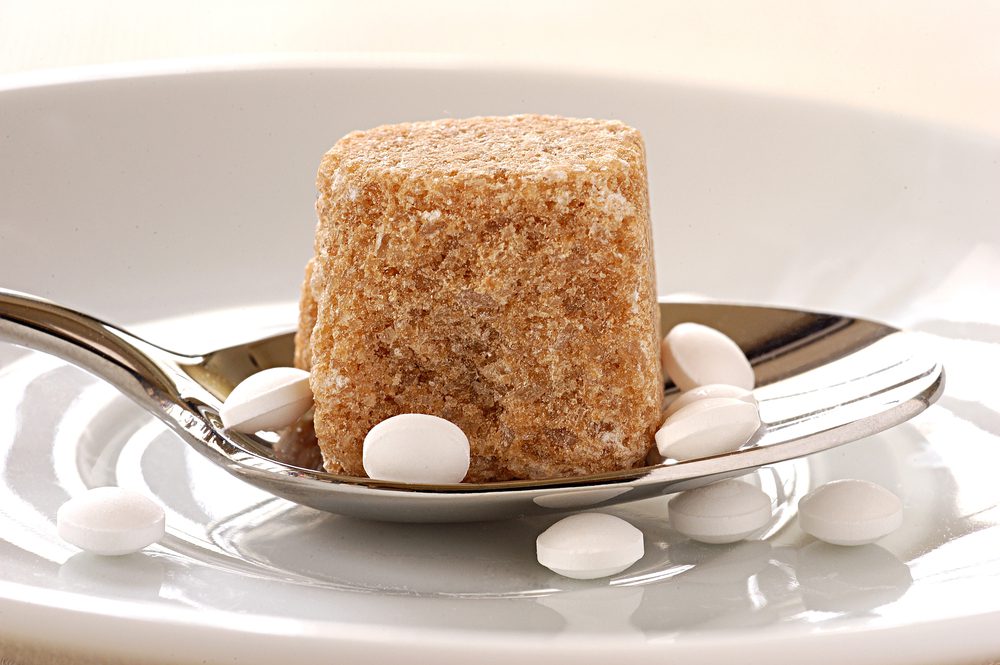During the holiday season, we are tempted by indulgent sweets and desserts so decadent that we can’t help but crave more! It’s not your imagination; sugar addiction is a real thing! The National Institute of Health (NIH) explains that when we consume sugar, the pleasure centers in the brain become triggered. This activation stimulates opioid and dopamine receptors, creating an addictive tendency that keeps us returning for more.
As the calendar turns to a New Year, our goals often shift to improving health and wellness and ridding the excess pounds we put on while celebrating the season. To create healthier habits, many people reach for artificial sweeteners to reduce calories, but is this healthy, or are we being deceived? The most recognized artificial sweeteners are saccharin, acesulfame, aspartame, neotame, sucralose, and Stevia. You’ll recognize these by the colorful packets on the tables at your favorite coffee shop. These tasty additives can be over 200x sweeter than sugar, requiring less product to achieve the same degree of sweetness.
Another draw for consumers is that many artificial sweeteners have little to no calories and are promoted as not impacting blood glucose (aka blood sugar), making them highly marketable to those individuals who monitor their sugar due to conditions like diabetes. Sounds good, right? Well, from a calorie-counting standpoint, yes. In theory, creating a caloric deficit, whether from consuming less or exercising more, will result in weight loss. The problem with artificial sweeteners is that, despite being low/no in calories, the sweet taste still stimulates the pleasure centers in the brain as regular sugar does. This snowball effect may leave you craving more food because you may not feel full after eating them, or they may leave you longing for more sweets. Don’t beat yourself up when you feel yourself being seduced by sweets. This uncontrollable craving is not due to a lack of willpower; it’s science. Harvard Health Publishing referenced a study of cocaine-addicted rats. When they were offered a choice of cocaine-laced water or water containing the artificial sweetener saccharin. The results showed the majority of the rats chose the artificial sweetener! Additionally, some studies have linked artificial sweeteners to certain cancers.
Artificial sweeteners are marketed to those seeking to consume fewer calories and lose weight. Unfortunately, their effect on the brain can leave users consuming more food overall, which can further slow the metabolism. Another point to consider is how many people rationalize the use of these artificial sweeteners by thinking if they are drinking a diet soda, it’s OK to order a giant French fry and the biggest burger on the menu in the fast-food drive-thru. This psychological mind-game can lead to poor food choices that can thwart your weight-loss efforts leading to an increased risk of cardiovascular disease, diabetes, high blood pressure, inflammation, and cancer. Artificial sweeteners can also alter the composition of the gut microbiota. This is important to consider because the gut (aka the “second brain”) can impact immunity and our metabolism.
So, what can we do? Breaking up with sugar (and sugar substitutes) is your best bet to achieve your weight loss goals. Here are 5 tips to help you succeed:
- Go Au Naturel — The Cleveland Clinic recommends choosing natural sweeteners like honey, maple syrup, agave, or fruit nectar. These are natural; however, they will impact blood glucose levels, which is vital for diabetics to consider before consuming. As a sweetener, dietitians often recommend Stevia because it is derived from a plant.
- Get Fresh — Consuming fresh fruit, which provides sweetness, includes vitamins, minerals, and the benefit of fiber, promoting digestive health.
- H2-Oh! — Instead of soda or sugary beverages, reach for water. Water helps hydration, aids the digestive process, and helps you feel full. For flavor, add a few frozen berries or a squeeze of lemon.
- Measure Up — Begin to measure the sugar or sweeteners you add to things like cereals or coffee. You may be surprised! Once you know how much you are using, you can consciously begin to use less.
- Second-Guess Yourself — Normally, second-guessing yourself is not something that is recommended; however, in this case, pausing and second-guessing yourself can support your health goals. Before reaching for a sweet treat, ask yourself if you are truly hungry or are you thirsty? Ask if you have an alternative? Do you have better options? Ask what is the benefit of eating this and how will I feel afterward? Ask yourself, what is my end goal, and is this choice supporting that goal?
As we consider the festivities and feasts brought about by the holiday season, know that you don’t have to wait until the New Year to begin practicing healthy habits. In fact, you don’t even have to wait until a Monday – raise your hand if you’ve said, “I’ll start on Monday.” Healthy habits and good food choices can begin with the next trip to the grocery store, sip, or meal. No need to wait! Start living your healthiest life NOW! There’s no time like the present!

